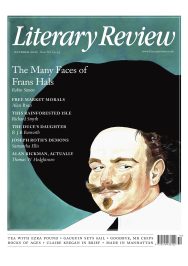Iain Bamforth
The Bonnie Banks o’ Zuiderzee
Scotland: The Global History – 1603 to the Present
By Murray Pittock
Yale University Press 512pp £25
The Thirty Years’ War – that protracted conflict between Protestant and Catholic forces which was concluded by the Peace of Westphalia in 1648 – is generally scanted in histories of the British Isles as having had a minimal impact on British politics. In his capacious new history of Scotland since the regnal union of 1603, ambitiously titled Scotland: The Global History, Murray Pittock gives it full consideration because of the ‘confederal flavour … with elements of composite monarchy’ that it gave to the notion of state sovereignty. Instead of going the way of Portugal and Spain, which had been united under the Habsburgs in the Iberian Union (1580–1640) but eventually separated after a successful Portuguese military campaign (supported by English forces), the English and Scottish parliaments voted in 1706 and 1707 to merge the two kingdoms into a new entity: the Kingdom of Great Britain.
The two most arresting parts of Pittock’s history, which develops from pioneering work by Michael Fry and Christopher Harvie, are his accounts of Scotland’s attempts in the century before the union of the parliaments to project its power overseas and of the sudden spurt given to individual Scottish talent by the Act of Union. A glimpse of the highly Europeanised Scottish policy of the 17th century is provided by a passing incident in the German picaresque novel Simplicius Simplicissimus (1668), which was directly inspired by the horrific events of the Thirty Years’ War (in which the German-speaking lands lost a third of their populations): its hapless hero is hauled before the governor of the town of Hanau, ‘a Scot by the name of James Ramsay’. Scotland’s commercial, cultural and military clout was wide-reaching. Sweden’s Stormaktstiden, or ‘Age of Greatness’, was abetted by Scots, who, like Ramsay, governed many of its provinces during the Thirty Years’ War and ran its navy. Scots also distinguished themselves militarily and administratively in Denmark-Norway, the Baltic states and Poland (Alexander Chalmers of Dyce ended up four times mayor of Warsaw). It was their ‘incredible fighting spirit’ that formed the basis, Pittock suggests, of the leading role Scottish soldiers came to play in the British Empire.
Most important for Scotland in this era was the Dutch Republic, the population of which shared with the Scots a Calvinist faith. The town of Veere in Zeeland was a staple where Scottish imports enjoyed tax concessions. Between 1676 and 1725, almost 6 per cent of all students

Sign Up to our newsletter
Receive free articles, highlights from the archive, news, details of prizes, and much more.@Lit_Review
Follow Literary Review on Twitter
Twitter Feed
'A charming and amusing personal history'
Don't miss this brilliant @Lit_Review review of #WorldCupFever 👇
@KuperSimon's must-read footballing journey in nine tournaments is out now ⚽️🏆
Michael Taylor - The Beautiful Game
Michael Taylor: The Beautiful Game - World Cup Fever: A Footballing Journey in Nine Tournaments by Simon Kuper; Th...
literaryreview.co.uk
In the summer of 1918, the Caspian port of Baku played host to a remarkable group of Allied soldiers, sent to defend oil wells against the Ottomans.
Anna Reid recounts their escapades.
Anna Reid - Mission Impossible
Anna Reid: Mission Impossible - Mavericks: Empire, Oil, Revolution and the Forgotten Battle of World War One by Nick Higham
literaryreview.co.uk
Alfred, Lord Tennyson is practically a byword for old-fashioned Victorian grandeur, rarely pictured without a cravat and a serious beard.
Seamus Perry tries to picture him as a younger man.
Seamus Perry - Before the Beard
Seamus Perry: Before the Beard - The Boundless Deep: Young Tennyson, Science, and the Crisis of Belief by Richard Holmes
literaryreview.co.uk